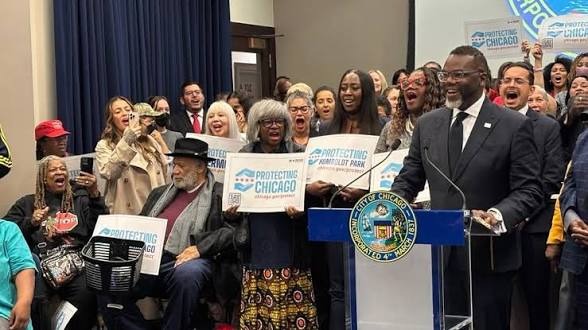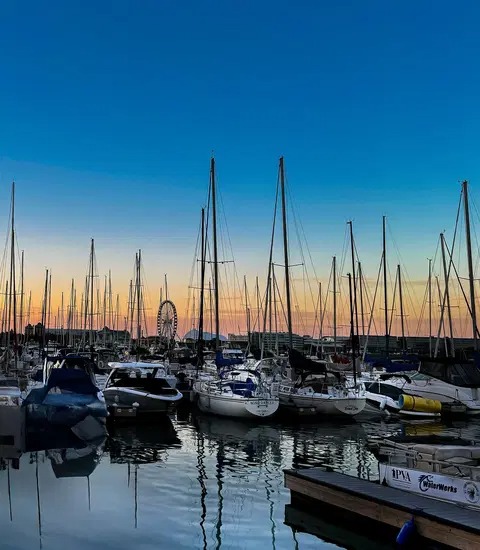
October 18, 2025
Boating
“By raising the tax on boat mooring fees — from ~7 % to possibly ~21 % or more — the City of Chicago aims to raise additional millions, shift the burden toward wealthier or non-resident leisure users, and avoid broad tax hikes on residents.”
In October 2025, Mayor Brandon Johnson unveiled his 2026 budget proposal for the City of Chicago: a $16.6 billion plan aimed at closing an estimated $1.15 billion deficit. Among the revenue features is a significant increase in the city’s boat-mooring tax (often dubbed the “yacht tax”) — from the current 7 % to significantly higher levels.
Here’s what the proposal is, why it’s being raised, who it affects, and what the ripple effects could be.

If done without care, it could generate unintended consequences: less harbor usage, revenue shortfalls, and political regrets.


Often when people say “yacht tax” in Chicago they are referring to a little-known but real fee: the 7 % tax the City of Chicago charges on the mooring or docking fee for any watercraft within the city’s jurisdiction (harbors, river slips, etc.). The key features:
It is not a tax on the boat’s value, nor a general ownership tax. It is applied to the fee you pay to moor or dock the boat.
The person paying the mooring or docking fee is responsible for the tax.
The marina or docking facility collects the fee (including the tax) and remits it to the city’s Department of Finance.
Some exemptions apply: watercraft owned by a governmental body, or where other constitutional protections apply, are not subject to the tax.
In short: you bring your boat into a dock slip in city waters (Lake Michigan shoreline harbors, riverfront marinas), you pay the regular mooring fee plus 7% tax today.
Mayor Johnson’s budget documents and reporting show that the mooring tax would be tripled under his proposal. One summary noted it would involve “tripling the 7 % ‘Yacht Tax’ on those mooring boats in Chicago’s harbor.” Other reporting from CBS indicates the increase in mooring-boat fees is expected to generate about $4.1 million annually.
While the exact new rate perhaps has some fine print yet to be formally adopted (as budget negotiations continue), the rough aim is to raise the tax well beyond 7%. Some sources interpret “tripling” literally: ~21 % or higher, though your background note mentions 23.25 % — that may reflect different drafting or illustration. The city materials themselves cite big new revenues from a raising of the “yacht docking fee.”
The Johnson administration frames the proposal in several ways:
Progressive taxation: The proposed increases are part of a broader set of revenue ideas that specifically target wealthier individuals, large corporations and non-residents rather than working‐class property-tax paying homeowners. For example, the budget also proposes a social-media tax, a “head tax” on large employers, and increased fees targeting cloud computing/tech companies.
Protecting the budget: With a projected deficit of more than a billion dollars (driven by end of federal aid, pension obligations, and other structural costs), the mayor has said the city must find new revenue rather than raise property taxes or grocery/garbage fees.
“Luxury” or non-essential services: Although a boat slip is not exactly a “luxury” in all cases, the narrative shifts toward putting more of the burden on higher-end boat owners (especially non-resident owners) rather than general taxpayers. Some versions of the proposal emphasize higher fees for “non-residents” docking in Chicago waters.
In short: the mayor is attempting to shift the balance so that those with leisure or large-asset watercraft contribute more to the city’s coffers, thereby easing somewhat the tax pressure on ordinary residents.
Here are the stakes:
Boat owners who pay mooring/docking fees in Chicago: If you own or rent a slip in a Chicago harbor, the applicable tax on that fee will rise. For example, if your mooring fee is $10,000 annually and today you pay $700 in tax (7 %), under a 21 % rate you’d pay $2,100 — a difference of $1,400.
Non-resident vs resident owners: The budget lines suggest that non-resident boats might face even higher effective mooring tax increases. That could discourage out-of-town vessels from using Chicago slips (or motivate owners to relocate).
Marinas and docking facilities: The tax is collected by the marina (or docking facility) and remitted to the City. Higher rates may affect the attractiveness of Chicago slips and could shift competitive dynamics (vessels may choose suburbs or other states).
City revenue: The city expects the increase to bring in additional millions (quoted figure $4.1 m/year) to help balance the budget.
Residents and taxpayers: By targeting mooring fees rather than general property taxes, the city hopes to protect many residents from paying more — but outcomes depend on whether revenue goals are met and cost pressures continue.
Additional revenue: The city gets more money to invest in public services, schools, infrastructure or other priority areas.
Fairer tax mix: Supports the idea that those with higher-asset recreational means (boating in Chicago waters) should contribute more.
Avoiding property tax hikes: By tapping new revenue streams, the mayor argues the city may avoid raising property taxes or basic service fees for average homeowners/renters.
Symbolic value: The increase signals that the city is serious about progressive taxation, tackling wealth inequality, and shifting fiscal burden away from working families.
Potential reduction in boat traffic: Higher docking taxes may discourage boaters (especially non-residents) from using Chicago harbors, possibly reducing ancillary spending (marina services, fuel, restaurants, tourism) and hurting local businesses.
Competitive disadvantage: Nearby jurisdictions may have lower mooring taxes; boat owners may relocate slips to suburbs or other states, diminishing the base.
Question of “luxury” vs “need”: Some argue that boats and slips are already taxed in many ways (state taxes, federal regulations, personal property taxes) and increasing one more tax may feel punitive rather than equitable.
Legal and administrative complexity: Raising a tax rate is straightforward, but ensuring collection, avoiding evasion, and coping with unintended consequences (boaters shifting locations, marinas adjusting contracts) could lead to implementation challenges.
Is it sufficient long-term?: The $4.1 m revenue estimate is modest relative to the billion-plus shortfall. Without structural fiscal reform, the city might still face deficits. Indeed analysts point out that the mayor’s budget avoids major pension reform and relies heavily on one-time surplus sources.
Perception and political backlash: Some view this as “punishing success” or “targeting leisure” rather than building sustainable growth, which could generate political resistance (from marinas, business groups, or boat owners).
This mooring tax hike is only one piece of a broader fiscal strategy:
The mayor’s 2026 budget proposes no increase in property taxes or garbage/grocery fees for now.
He proposes new taxes and fees targeting large-employers, tech firms, social media, and cloud computing services.
The mayor is also tapping a record surplus in the city’s TIF (Tax Increment Financing) funds to help balance the budget.
But major structural cost drivers — pension liabilities, long-term obligations — remain largely unaddressed.
In this sense, the mooring tax increase is a tactical move to raise revenue quickly and shift burden, but it does not by itself solve the deep structural fiscal issues facing Chicago.
Let’s walk through a hypothetical to visualize how the tax increase works.
Say you own a slip in a Chicago harbor and pay $20,000/year in mooring fees. At 7 % you currently pay $1,400 in tax. If the rate rises to ~21 %, your tax becomes $4,200 — an increase of $2,800. Over a five-year period, that’s $14,000 more in tax than before. For many leisure boat owners this may be a manageable cost, but it’s meaningful.
From the city’s perspective: if there are (for example) 1,000 such slips subject to the tax (just for illustration) each paying $2,000 more in tax on average, that’s $2 million a year in new revenue. The $4.1 million projected suggests either more slips, higher fee bases, or a somewhat higher rate than 21 %. Implementation details (which slips, what counts as “non-resident,” etc.) will matter.
The language around “tripling the tax” is deliberate.
It signals boldness: Rather than a small uptick, this is a large jump, suggesting the city is serious about progressive taxation.
Timing: With the city facing a large deficit and pressure on municipal services, the mayor is turning to less-traditional revenue streams (rather than hitting property tax payers).
Targeting: By focusing on boat-mooring and slips (rather than boat ownership values or registration), the city is going after a specific revenue base tied to usage in its jurisdiction — making it harder to move to suburbs without cost.
Political messaging: Framing the tax as a contribution from “wealthy leisure” rather than working families makes it more politically palatable (at least for the mayor’s coalition).
Since this is a budget proposal, there are several key variables that will determine how this plays out:
Final rate and structure: The proposed “tripling” may end up as, say, 20 %-25 % or may include sliding scales (resident vs non-resident, size of vessel, length of stay). Also, exemptions or caps may be introduced.
Council amendments: The City Council will continue reviewing and amending the budget; this tax may be softened or adjusted in negotiation.
Implementation and enforcement: How marinas will collect, whether owners will relocate, whether the city will see expected revenue without unintended declines in harbor use.
Behavioral responses: If boat owners decide to leave Chicago marinas for nearby lower-tax slips, the base shrinks. Conversely, the increase might not deter usage much if the clientele are less sensitive to cost.
Budget overall and structural reforms: Will the mooring tax increase be enough, or is it a band-aid on deeper fiscal issues? Will the city pair revenue increases with meaningful cost and pension reforms?
Equity and optics: How the public perceives targeting boat mooring fees (and potentially non-resident boaters) may influence political support. If the tax burden shifts but services don’t improve, backlash may grow.
Overall, we see Mayor Johnson’s mooring tax proposal as a somewhat smart, politically savvy move — particularly in the context of a city stretched financially and seeking to protect ordinary taxpayers. Some strengths and cautions:
Strengths
It targets a relatively narrow base (boat mooring) rather than broad-based tax increases.
It aligns with progressive tax philosophy (ask more from those with leisure assets or who use city-owned waterfront).
The revenue, while modest relative to the overall budget, is still meaningful and helps diversify the city’s revenue streams.
The political framing is strong: shift burden, protect working families, make wealthier users pay their share.
Cautions
It depends heavily on assumptions: many boat owners may respond by relocating, reducing revenue.
It doesn’t address the core structural issues (pensions, long-term liabilities). Without those, the city may face similar deficits again.
It could create competitive disadvantages for Chicago’s harbors if nearby jurisdictions have lower tax burden.
The increase, while symbolic and somewhat progressive, may still leave the perception of “another tax” and depending on economic conditions could be seen as less justifiable.
In short: It’s a reasonable move, but far from a silver bullet. The devil will be in the details and the follow-through.
For boat owners, especially those docking in Chicago waters:
You’ll want to check your mooring contract and tax line: will the increased rate apply immediately? Will it be passed on by the marina?
Some owners may evaluate alternatives (e.g., suburban marinas, nearby states, shorter stays) if the tax differential is large.
For non-resident boat owners, the increased cost may tip the balance of whether Chicago is a cost-effective harbor.
For marinas and docking facilities:
They may need to adjust pricing, marketing, and incentives to maintain occupancy.
They ought to engage with city officials to understand how the tax is to be applied (resident vs non-resident, size thresholds, etc.).
They may anticipate potential drop in demand – so risk mitigation or value-added services might become more important.
For the city:
Monitoring the actual revenue and elasticity of demand will be crucial. If revenues fall short (because mooring usage drops), the city may need to revisit its assumptions.
Using the extra revenue effectively and visibly will help maintain political support (e.g., directing funds to waterfront improvements, public access, harbor amenities) so the tax increase feels tied to value, not just cost.
Communicating the fairness and rationale will help. If boat owners feel singled out unfairly or residents see little benefit, backlash could grow.
Mayor Brandon Johnson’s proposal to triple the mooring (or “yacht”) tax in Chicago is an illustrative example of how cities are increasingly tapping non-traditional revenue streams to balance budgets and pursue progressive tax policy. By raising the tax on boat mooring fees — from ~7 % to possibly ~21 % or more — the City of Chicago aims to raise additional millions, shift the burden toward wealthier or non-resident leisure users, and avoid broad tax hikes on residents.
Yet this move, while strategically sound in many ways, is not without risk. The actual revenue gain depends on behavior (will boaters stay or leave?), the rate may face push-back, and the increase does not solve larger structural challenges in city finance. For boat owners and marinas, it will mean re-evaluating costs and market positioning. For the city, it means delivering value, ensuring competitiveness, and balancing ambition with realism.
In the end, if implemented thoughtfully and paired with smart spending and reform, the tax hike could contribute to a more sustainable fiscal path. If done without care, it could generate unintended consequences: less harbor usage, revenue shortfalls, and political regrets. Time, and the budget negotiations ahead, will tell.
Post Tags :
When a chef opens their home, it changes everything.
Playpen Chicago partnered with @chefandysuarez on a multi-course dinner inside his Chicago apartment ✨ we grabbed some friends and spent a memorable evening dining on a range of cuisines, which he brings to his private events and classes in a setting built for connection 🤝
🎥: @right_angle_visuals
#PlaypenChicago #ChicagoChef #PrivateDiningChicago #ChicagoFoodCulture #Chicago

When a chef opens their home, it changes everything.
Playpen Chicago partnered with @chefandysuarez on a multi-course dinner inside his Chicago apartment ✨ we grabbed some friends and spent a memorable evening dining on a range of cuisines, which he brings to his private events and classes in a setting built for connection 🤝
🎥: @right_angle_visuals
#PlaypenChicago #ChicagoChef #PrivateDiningChicago #ChicagoFoodCulture #Chicago
...
Chicago, stay warm and safe out there! We’re channeling these vibes this weekend 🙌

Chicago, stay warm and safe out there! We’re channeling these vibes this weekend 🙌 ...
✨Happy Friday✨ ...
Counting down the days until we’re back on the lake! It’s never to early to work on finding your friends with boats now ➡️ playpenchicago.com
📸: @lensoflyons

Counting down the days until we’re back on the lake! It’s never to early to work on finding your friends with boats now ➡️ playpenchicago.com
📸: @lensoflyons
...
The holidays are over, can we get back to our regularly scheduled summer programming now?
📸: @ashleysummersphotography

The holidays are over, can we get back to our regularly scheduled summer programming now?
📸: @ashleysummersphotography
...
Wishing everyone a Happy 2025! 🎊
📸: @lensoflyons

Wishing everyone a Happy 2025! 🎊
📸: @lensoflyons
...
Ofc we love the holidays but we’re also counting down the days to May…

Ofc we love the holidays but we’re also counting down the days to May… ...
Experiences, elevated ✨ catch us on the water and in the city!
🎥: @caseyalexandramedia
🍝: @chefandysuarez

Experiences, elevated ✨ catch us on the water and in the city!
🎥: @caseyalexandramedia
🍝: @chefandysuarez
...
Copyright © 2022-2025 The Playpen Enterprises LLC – All Rights Reserved